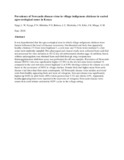| dc.contributor.author | Njagi, L W | |
| dc.contributor.author | Nyaga, P N | |
| dc.contributor.author | Mbuthia, P G | |
| dc.contributor.author | Bebora, L C | |
| dc.contributor.author | Michieka, J N | |
| dc.contributor.author | Kibe, J K | |
| dc.contributor.author | Minga, U M | |
| dc.date.accessioned | 2013-03-15T13:11:11Z | |
| dc.date.issued | 2010 | |
| dc.identifier.citation | Livestock Research for Rural Development 22 (5) 2010 | en |
| dc.identifier.uri | http://erepository.uonbi.ac.ke:8080/xmlui/handle/123456789/14174 | |
| dc.description.abstract | It was hypothesized that the agro-ecological zone in which village indigenous chickens were farmed
influenced the level of diseases occurrence. One hundred and forty four apparently healthy chickens
(71 from lower highland 1, a cold zone and 73 from lower midland 5, a hot zone) were randomly
sampled. Oro–pharyngeal and cloacal swabs were collected from each bird and processed for virus
isolation in 10-12 day old embryonated chicken eggs. In addition, blood, without anticoagulant was
obtained from each bird through wing venipuncture. Haemagglutination inhibition assay was
performed for all sera samples.
Prevalence of Newcastle disease (NDV) virus was significantly higher (17.8%) in the dry hot zone
(lower midland 5) compared to the cool wet zone (lower highland 1) at 9.9% showing evidence for
climate as a risk factor in the occurrence of NDV in village chicken. Female birds had higher mean
Newcastle disease viral titers than their male counterparts. All Newcastle disease virus isolates
recovered were from healthy appearing birds and were all velogenic. Sero-prevalence was significantly
highest (p<0.05) in adult birds (10%) while growers had 5.1% and chicks 2.9%. Apparently healthyappearing
birds were reported to be reservoirs of velogenic Newcastle disease virus strains that could
initiate endemicity NDV cycles in the village setting. | en |
| dc.language.iso | en | en |
| dc.subject | cool and dry zones | en |
| dc.subject | healthy-appearing chickens | en |
| dc.subject | reservoirs | en |
| dc.subject | velogenic Newcastle disease virus | en |
| dc.title | Prevalence of Newcastle disease virus in village indigenous chickens in varied agro-ecological zones in Kenya | en |
| dc.type | Article | en |
| local.publisher | Department of Veterinary Pathology, Microbiology & Parasitology Faculty of Veterinary Medicine University of Nairobi | en |

